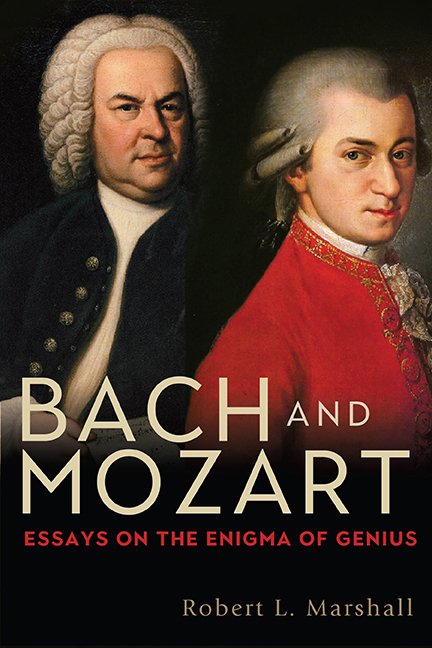Book contents
- Frontmatter
- Dedication
- Epigraph
- Contents
- List of Figures
- Preface
- List of Abbreviations
- Prologue. The Century of Bach and Mozart as a Music-Historical Epoch: A Different Argument for the Proposition
- 1 Young Man Bach: Toward a Twenty-First-Century Bach Biography
- 2 The Notebooks for Wilhelm Friedemann and Anna Magdalena Bach: Some Biographical Lessons
- 3 Bach and Luther
- 4 Redeeming the St. John Passion–and J. S. Bach
- 5 Bach's Keyboard Music
- 6 The Minimalist and Traditionalist Approaches to Performing Bach's Choral Music: Some Further Thoughts
- 7 Truth and Beauty: J. S. Bach at the Crossroads of Cultural History
- 8 Bach at Mid-Life: The Christmas Oratorio and the Search for New Paths
- 9 Bach at the Boundaries of Music History: Preliminary Reflections on the B-Minor Mass and the Late-Style Paradigm
- 10 Father and Sons: Confronting a Uniquely Daunting Paternal Legacy
- 11 Johann Christian Bach and Eros
- 12 Bach and Mozart: Styles of Musical Genius
- 13 Mozart and Amadeus
- 14 Bach and Mozart's Artistic Maturity
- 15 Mozart's Unfinished: Some Lessons of the Fragments
- Epilogue (ossia Postmortem). Had Mozart Lived Longer: Some Cautious (and Incautious) Speculations
- Notes
- Works Cited
- Index
- Miscellaneous Endmatter
- Eastman Studies in Music
9 - Bach at the Boundaries of Music History: Preliminary Reflections on the B-Minor Mass and the Late-Style Paradigm
Published online by Cambridge University Press: 29 March 2020
- Frontmatter
- Dedication
- Epigraph
- Contents
- List of Figures
- Preface
- List of Abbreviations
- Prologue. The Century of Bach and Mozart as a Music-Historical Epoch: A Different Argument for the Proposition
- 1 Young Man Bach: Toward a Twenty-First-Century Bach Biography
- 2 The Notebooks for Wilhelm Friedemann and Anna Magdalena Bach: Some Biographical Lessons
- 3 Bach and Luther
- 4 Redeeming the St. John Passion–and J. S. Bach
- 5 Bach's Keyboard Music
- 6 The Minimalist and Traditionalist Approaches to Performing Bach's Choral Music: Some Further Thoughts
- 7 Truth and Beauty: J. S. Bach at the Crossroads of Cultural History
- 8 Bach at Mid-Life: The Christmas Oratorio and the Search for New Paths
- 9 Bach at the Boundaries of Music History: Preliminary Reflections on the B-Minor Mass and the Late-Style Paradigm
- 10 Father and Sons: Confronting a Uniquely Daunting Paternal Legacy
- 11 Johann Christian Bach and Eros
- 12 Bach and Mozart: Styles of Musical Genius
- 13 Mozart and Amadeus
- 14 Bach and Mozart's Artistic Maturity
- 15 Mozart's Unfinished: Some Lessons of the Fragments
- Epilogue (ossia Postmortem). Had Mozart Lived Longer: Some Cautious (and Incautious) Speculations
- Notes
- Works Cited
- Index
- Miscellaneous Endmatter
- Eastman Studies in Music
Summary
Beethoven famously declared that Bach's name was a misnomer: “His name ought not to be Bach [brook] but Meer [ocean].” Who would disagree! It is no surprise that the oceanic, qualitative immensity of Bach's achievement is matched by a com-parably oceanic, if quantitative, immensity of the literature devoted to it—and to the composer himself. The indispensable on-line database, Bach Bibliography, com-piled by Yo Tomita (Queen's University, Belfast) under the auspices of the Bach-Archiv, Leipzig, records, at present (2018), some 73,000 publications devoted to the composer and his works. About the B-Minor Mass the bibliography reveals that it is easily Bach's most written-about work. So much has already been said about it that it is hard to imagine that there is still more to add. In the twenty years from 1997 to 2017 over 150 publications devoted to the Mass had appeared—easily outpacing the number devoted to the St. John and St. Matthew Passions in the same time span (110 and 106 publications, respectively). As for Bach's instrumental works: there had been an even hundred dedicated publications to The Well-Tempered Clavier, and a mere twenty-one to the Brandenburg Concertos in that period. These statistics, incidentally, did not include all the discussions of these works in general treatments of Bach's music.
The extensive scholarly attention to the Mass reflects its immense, long-standing popularity with the musical public—a popularity readily explained: it is in the supra-national Latin rather than German and sets a universally familiar, effectively supra-denominational (if undeniably religious) text. The composition, moreover, taken as a whole (and in contrast to the Passions, for example), is colorful, lively, and— measured against the composer's own standards—much of the time remarkably euphonious, even jubilant. None of this, of course, denies its pervasive seriousness and—once again, measured against the composer's own standards—extraordinary compositional complexity.
The B-Minor Mass's immediacy of appeal is an anomaly among late works by great composers. Thanks to Theodor Adorno, the concept of “late style” in music has largely come to be equated with that of Beethoven. Indeed the very term, “late style” (Spätstil), was coined by Adorno in his 1937 essay, “Spätstil Beethovens,” and pursued by him further in his “Verfremdetes Hauptwerk: Zur Missa Solemnis” (1959).
- Type
- Chapter
- Information
- Bach and MozartEssays on the Engima of Genius, pp. 148 - 155Publisher: Boydell & BrewerPrint publication year: 2019



